Best Israeli history movies
Get ready to binge. We've found a collection of must-watch history films from Israel, now streaming on Netflix, HBO, Hulu, Prime Video, and other top services!
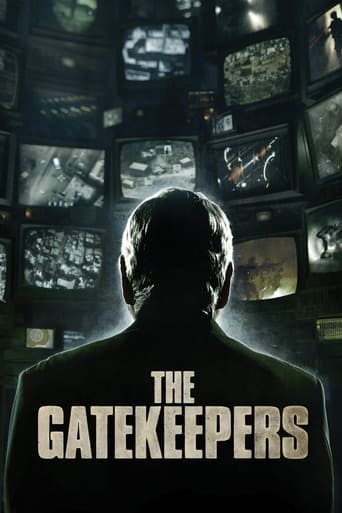
The Gatekeepers 2012
In an unprecedented and candid series of interviews, six former heads of the Shin Bet — Israel's intelligence and security agency — speak about their role in Israel's decades-long counterterrorism campaign, discussing their controversial methods and whether the ends ultimately justify the means.
75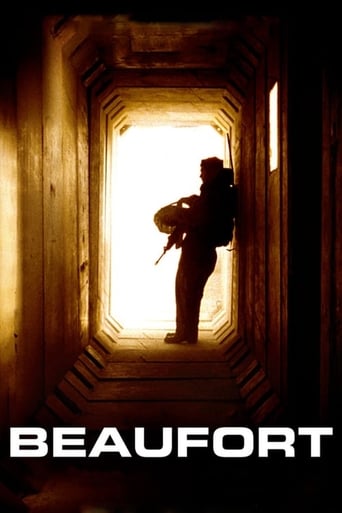
Beaufort 2007
BEAUFORT tells the story of LIRAZ LIBERTI, the 22 year-old outpost commander, and his troops in the months before Israel pulled out of Lebanon. This is not a story of war, but of retreat. This is a story with no enemy, only an amorphous entity that drops bombs from the skies while terrified young soldiers must find a way to carry out their mission until their very last minutes on that mountaintop.
69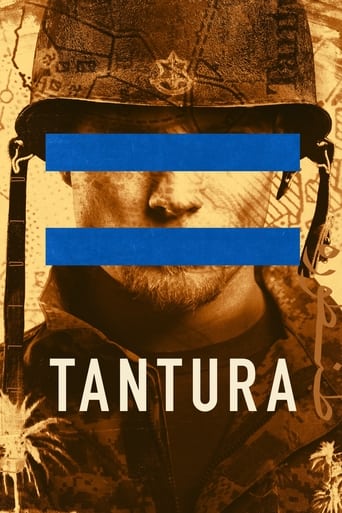
Tantura 2022
When, in the late 1990s, Israeli student Teddy Katz exposed the massacre of Palestinian civilians by Israeli forces in the village of Tantura, in May 1948, during the first Arab-Israeli war, he was initially praised for his pioneering work; but he was soon infamous and branded a traitor. Decades later, incendiary new evidence emerges that corroborates Teddy's findings.
82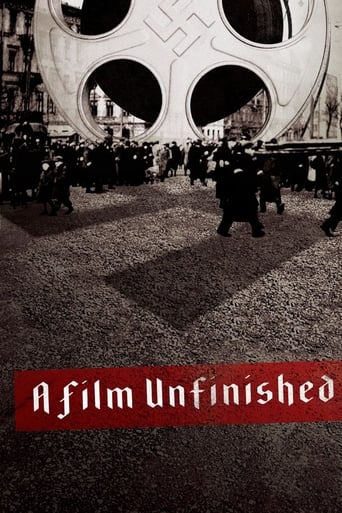
A Film Unfinished 2010
Yael Hersonski's powerful documentary achieves a remarkable feat through its penetrating look at another film-the now-infamous Nazi-produced film about the Warsaw Ghetto. Discovered after the war, the unfinished work, with no soundtrack, quickly became a resource for historians seeking an authentic record, despite its elaborate propagandistic construction. The later discovery of a long-missing reel complicated earlier readings, showing the manipulations of camera crews in these "everyday" scenes. Well-heeled Jews attending elegant dinners and theatricals (while callously stepping over the dead bodies of compatriots) now appeared as unwilling, but complicit, actors, alternately fearful and in denial of their looming fate.
69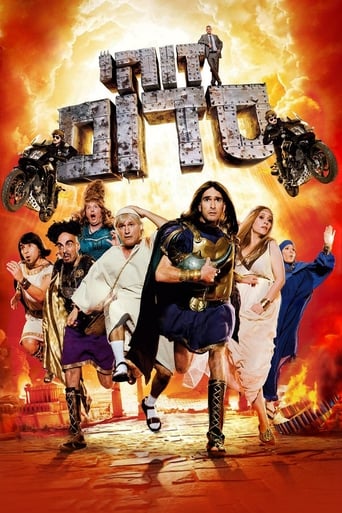
This Is Sodom 2010
When ancient Sodom is doomed to destruction due to its people's corrupt ways, Lot is the only righteous man destined to be spared.
77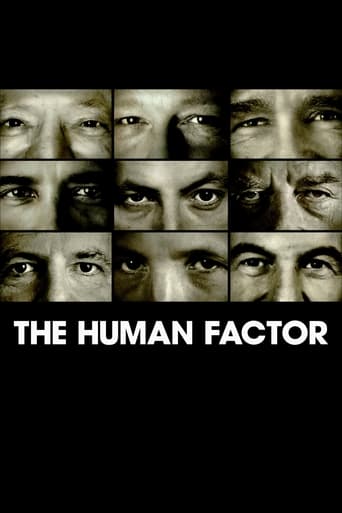
The Human Factor 2021
How US politicians and diplomats, over the past 25 years, have come close to achieving something almost impossible: securing peace between the State of Israel and its Arab and like-minded neighbors, mired in a struggle both dialectical and violent since the early 20th century, due to historical and religious reasons, entrenched offenses and prejudices, and the invisible and tyrannical hand of third countries' geopolitical interests in the area.
74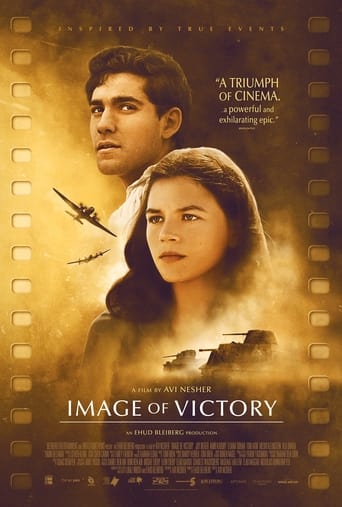
Image of Victory 2023
1948: an Egyptian filmmaker is creating newsreel stories about a volunteer force tasked to liberate Palestinian farmers. The journey propels him towards a chance encounter with a tenacious young leader of a nearby commune that will set in motion events that will change their lives forever.
73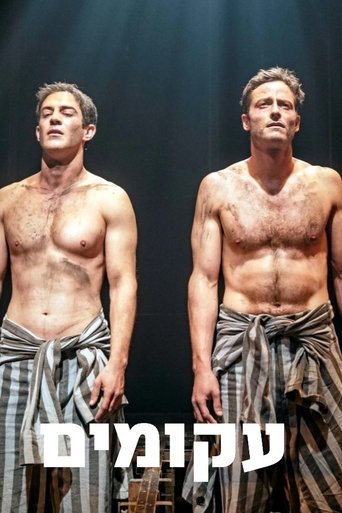
Bent 2018
Max and Rudy are a couple living a decadent lifestyle in pre-war Berlin, enjoying the nightlife and hedonistic parties: cocaine, orgies, and drag shows. After the rise of the Nazi party to power, Max is caught and sent to a concentration camp, where gay prisoners wear the pink triangle and have a status inferior even to Jewish prisoners. Max disguises himself as a Jew and wears the yellow star, hoping that his sexual orientation will not be revealed. Within the daily oppression of the concentration camp, Max meets Horst, a fellow prisoner to whom he confesses his true identity. Soon a forbidden love develops between them.
100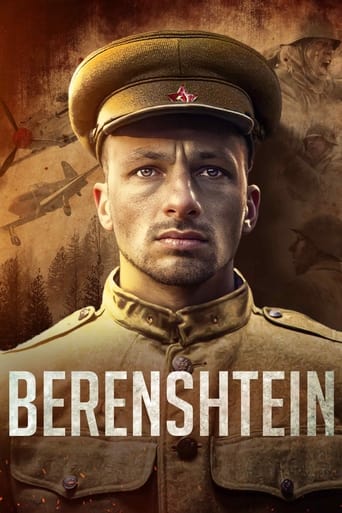
Berenshtein 2021
The unbelievable story of Leonid Bernshtein, a young Jewish soldier who rose to become the leader and led the operation to destroy the secret facility of the notorious Nazi V2 ballistic missiles.
69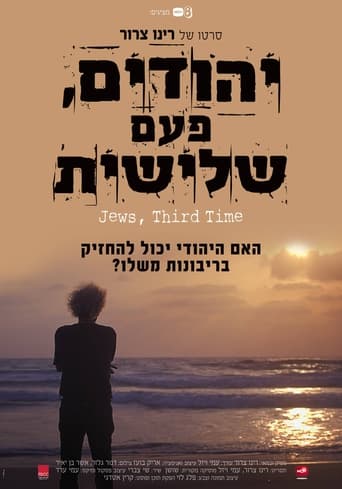
יהודים פעם שלישית 2017
90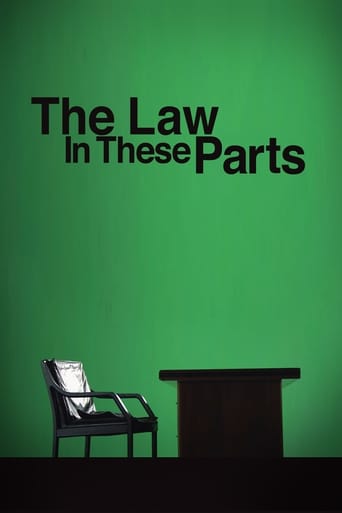
The Law in These Parts 2011
Can justice truly be served in the occupied territories given the current system of law administered by Israel for Palestinians? This documentary explores the history of Israel's military legal system in the Occupied Palestinian Territories of the West Bank and Gaza Strip.
69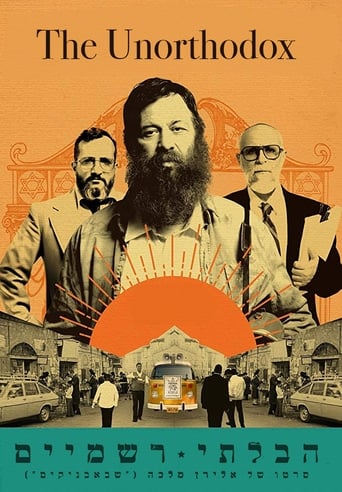
The Unorthodox 2018
The year is 1983 and Yaakov Cohen, the owner of a Jerusalem printing press, is tired from being pushed around. It seems that he was born on the wrong side, with the wrong family name and in a moment's decision he decides to establish a Sephardic-ultra-Orthodox list that will run to the Jerusalem municipality. He gathers two friends, and together they improvise a campaign - no means, no connections, no money, but with much rage, passion and a sense of justice.
68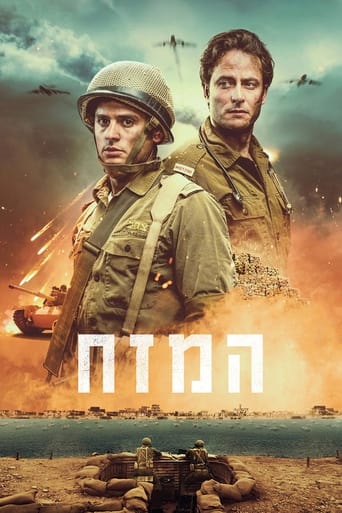
The Stronghold 2023
Based on real events that took place in the "Mazakh" bastion, the Yom Kippur war, the Sinai front. After a surprise Egyptian attack, 42 soldiers under the command of a young lieutenant from the Seder yeshiva, struggle to repel the enemy attacks during which many of the fighters are injured or killed. At the same time in the TAGD bunker, the Tel Avivian reserve doctor is fighting for the lives of the wounded fighters and calls for urgent evacuations that do not come. After a week of siege and fighting, the soldiers will have to choose whether to continue fighting under the orders of their commander, or to follow the plan of the reserve doctor - a plan that may save their lives. Will they decide to give up the values they were raised on and surrender, or will they fight to the last bullet?
73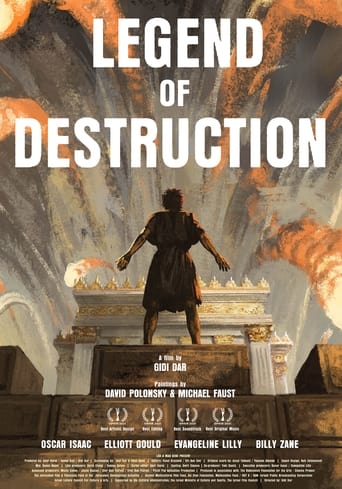
Legend of Destruction 2021
What had initially started out as a Jewish revolt against the Roman occupation, quickly turned into a fierce civil war. The combination of religious messianic zeal and the friction between social classes proved disastrous and resulted in the destruction of Jerusalem and the Holy Temple.
63
The Covenant 2013
Experience the pain of Egyptian slavery through the eyes of Moses' mother as she sets down her baby in to the Nile, the loyalty of Ruth as she pledges herself to Naomi and her God, and the turmoil of the Jews in Babylonian exile. Face the challenge with Esther as she risks her life to plead for her people, and see the suffering of the Jews in Jerusalem under Roman occupation. In the dark centuries following, The Covenant brings you to Shabbat tables of the persecuted Jewish families in Diaspora, ending in the Warsaw ghetto, and culminating in the Holocaust and the promised rebirth of the Jewish State in 1948.
70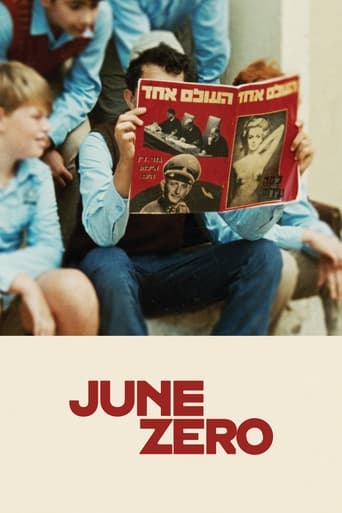
June Zero 2022
Israel, 1961. Nazi war criminal Adolf Eichmann, responsible for organizing the extermination of European Jews, is sentenced to death.
53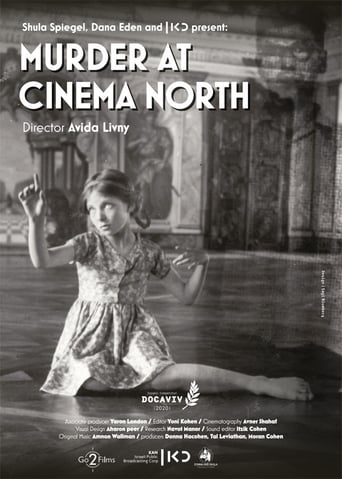
Murder At Cinema North 2020
A young Holocaust survivor who descends into crime; an Italian-Jewish engineer who wants to see a movie; a German Christian who forgives her husband’s murderer because of her Buddhist faith; and a Jewish woman who carries on an affair with a Nazi and exposes members of the resistance so that she and her children may survive: their fates intersect when two bullets are fired into a queue of people waiting to see “A Man Escaped” at Tel Aviv’s Cinema North in 1957.
60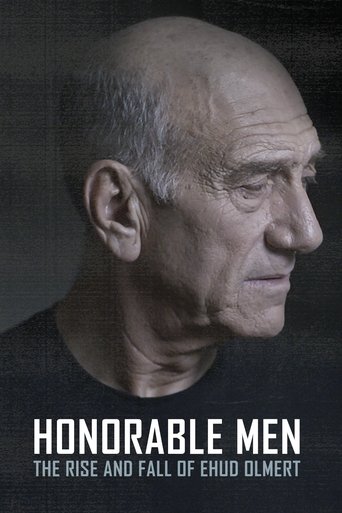
Honorable Men: The Rise and Fall of Ehud Olmert 2020
How former Israeli Prime Minister Ehud Olmert unexpectedly rose to power and how he dramatically fell from grace: from the most powerful position in the country to prison.
60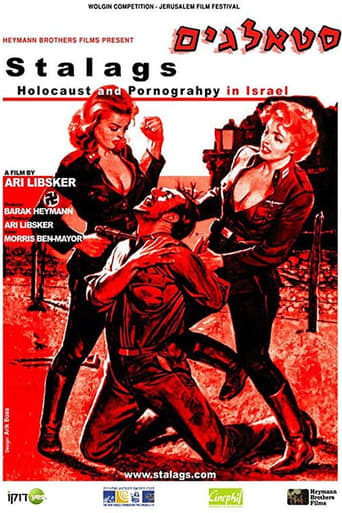
Stalags 2008
Stalags were pocket books whose plots revealed lusty female SS officers sexually abusing camp prisoners. During the 1960s, parallel to the trial held against Nazi war criminal Adolf Eichmann, sales of this pornographic literature broke all records in Israel and hundreds of thousands of copies were sold at kiosks. The popularity of the Stalags only declined after a much-reported trial, in which their authors were accused of distributing anti-Semitic pornography. This film examines the notorious phenomenon, exposing the creators of this genre for the first time. It posits that the combination of pornography and the Holocaust also appears in canonic Holocaust literature and continues to be a widespread part of the representation of the Holocaust in Israel today.
52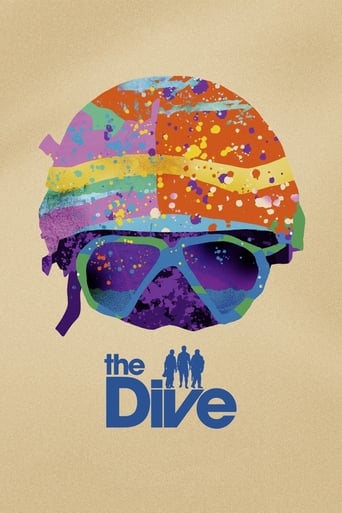
The Dive 2019
It is Thursday and another war is hitting the northern part of Israel hard. Three brothers reunite in their childhood kibbutz to bury their father. Two days later the youngest has to go to war, and while he seeks guidance from his older siblings who have both experienced the battlefield, the homecoming soon spins out of control.
55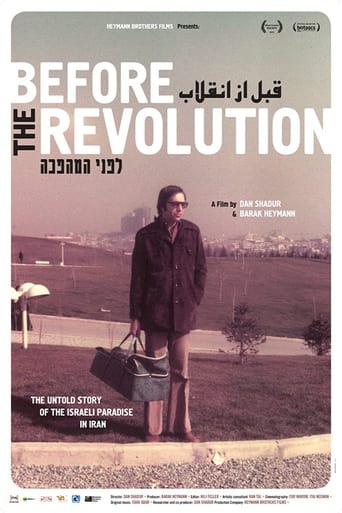
Before the Revolution 2013
A documentary thriller describing the last days of the Israeli community in Tehran, on the eve of the Islamic Revolution in 1979. The director, whose family was in Tehran at the time, uses rare archive materials to illustrate how thousands of Israelis, who enjoyed unusual affinity with the Shah's regime, wake up one morning to find their paradise vanished.
47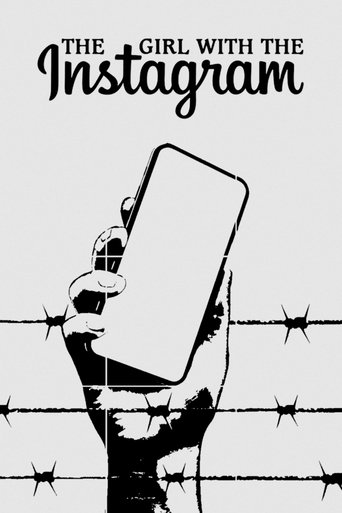
The Girl with the Instagram 2019
Nagyvárad, Hungary, 1944. From February to June, Eva Heyman, a 13-year-old Jewish girl, wrote a diary describing the harsh conditions of her life under Nazi occupation. How would she have told her story if she had used Instagram?
50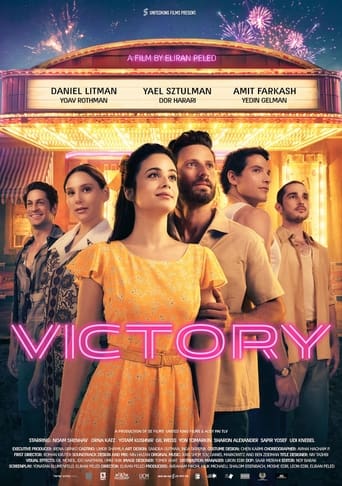
Victory 2024
In the height of Israel's post-"Six-Day War" euphoria, an up-and-coming actress is torn between her new glistening career and her husband's post-trauma.
50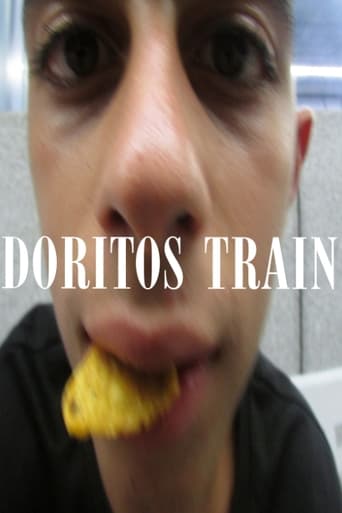
רכבת דוריטוס 2023
40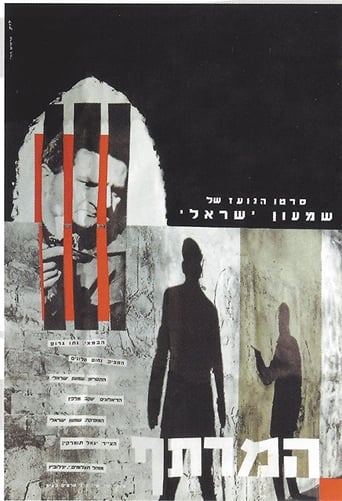
The Cellar 1963
About a year after the [Adolph] Eichmann trial, director and local industry pioneer, Natan Gross, explores the traumas of the Holocaust for the first time in Israeli film. Actor, Shimon Yisraeli, himself a pioneer of one-man shows on Israeli stages, wrote and spearheaded this one-man film which tells the story of Holocaust survivor, Emmanuel, who works as a security guard on a construction site where he grapples with all the memories of those dark times that come flooding back: the train journey, the Dachau death camp, his murdered paramour, and his former friend, Hans, who joined the Nazis and killed his father. He shows up at his childhood home where Hans now lives: following an encounter with a vicious dog, Emmanuel finds shelter in the house cellar where he bides his time – remembering, hallucinating, and working up an appetite for revenge. The Cellar won the Best Feature Film Suitable for Young People award at the Berlin International Film Festival.
10the lego movie 45 2023
A soldier returns home after World War II
10
The Man who Loves Hebrew 1991
At the beginning of the 20th century, a language war raged in Palestine. The contenders: Yiddish, Russian, French, German, English, and Hebrew, a language barely spoken for 2000 years. This feature film tells the dramatic life story of Eliezer Ben-Yehuda who championed the cause of modern Hebrew.
1042:6 - Ben Gurion 1969
The title is a reference to the Book of Isaiah 42:6, “I, the LORD, have called thee in righteousness, and will hold thine hand, and will keep thee free, and give thee for a covenant of the people, for a light of the Gentiles.” The film is an episodic, cinematic biography of David Ben-Gurion, from his days as a youth in Poland when he met Herzl in the town of Plonsk, through his move to Palestine/Israel, becoming leader, the days of the Independence War and the establishing of the State of Israel, signing the reparations agreement with Germany, and all the way to the making of this film – in the aftermath of the Six-Day War. Perlov’s film highlights all the key milestones in the leader’s life which it goes about doing in the tradition of the reflexive documentary, through the creator’s subjective and artistic pov. The film goes back and forth between documentary and scripted scenes, black and white and technicolour, and even archival footage colourised in bold, artificial colours.
10